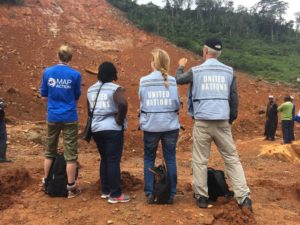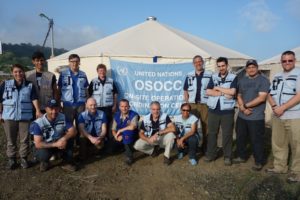MapAction’s Partners
MapAction never works in isolation. Our sole aim during an emergency is to quickly and effectively understand the decisions our partners need to make, then work out how to best provide the data to support those decisions. From that initial foundation we understand that MapAction is only effective when helping others to achieve their missions, and to do that requires true partnership.
Similarly we know that for MapAction to be effective requires the support and partnership of the many parties who invest their time and resources in us. We learn wherever we work, and we share what we learn.
We recognise that there are scores of global agencies well placed to deliver aid and emergency support, thousands more at national and sub-national levels. Our niche is to find the most effective ways to support and help those agencies, and to do that as efficiently as possible.

Global Partners – MapAction is proud to hold long-term relationships with key partners in the global humanitarian emergency response community, including ; UNDAC, UN OCHA, UNICEF, WHO, WFP, UNITAR, UNOSAT, INSARAG, International Federation of Red Cross and Red Crescent Societies, Save the Children, Oxfam and more.
Technical Partners – MapAction is one of a growing number of ‘technical humanitarian service provider’ agencies. We have developed good and often close working relationships with many, often holding MoUs with them. These include : ACAPS, REACH Initiative, START Network, CartONG, HOT OSM, Pacific Disaster Center, INFORM, iMMAP, H2H Network, Insecurity Insight, Translators without Borders and the list is growing. (If you aren’t on this list and should be, please contact us).
MapAction has completely transformed the speed and accuracy with which we can programme our response. I can’t imagine us being successful without their support.
Jesper Holmer Lund, United Nations Office for the Coordination of Humanitarian Affairs
Regional Partners, national and local partners – MapAction works closely with regional disaster management agencies including in South East Asia (AHA Centre), the Caribbean (CDEMA) and Central Asia (CESDRR). We are constantly looking to find and develop new relationships with partners in other regions, as this can be a very effective way of partnering with multiple national and sub-national partners. MapAction also looks to partner with organisations representing networks of specialist and subnational humanitarian organisations, such as ADRRN and GNDR. If you represnt such and organsation and wish to explore a partnership with MapAction please email us at info@mapaction.org.
Funding Partners – Of course without our funding partners MapAction could do little or nothing. Even though MapAction does much of its work through the time energy, talents and goodwill given by an exceptional team of highly skilled volunteer members, we still require resources, including money, to operate.
Whilst the demand and need for MapAction’s work is growing fast, and we are constantly encouraged by the opportunities to make aid more effective, as geospatial and data technology develops, we remain limited by the resources available to us. At the same time we are very grateful for the resources that we are granted, because we can see the impact they make. For information about our funding partners, please visit our funders page.
History of partnering with the United Nations

UNDAC – UN Disaster Assessment And Coordination is a part of UN OCHA and MapAction’s oldest deployment partner. UNDAC, and inceasingly over the years, other arms of the UN, frequently request MapAction support both before and during emergencies. We support UN training courses and simulation exercises, providing mapping support and humanitarian mapping workshops. We also collaborate to jointly develop new ideas and define and engender good practice in the use of data.
